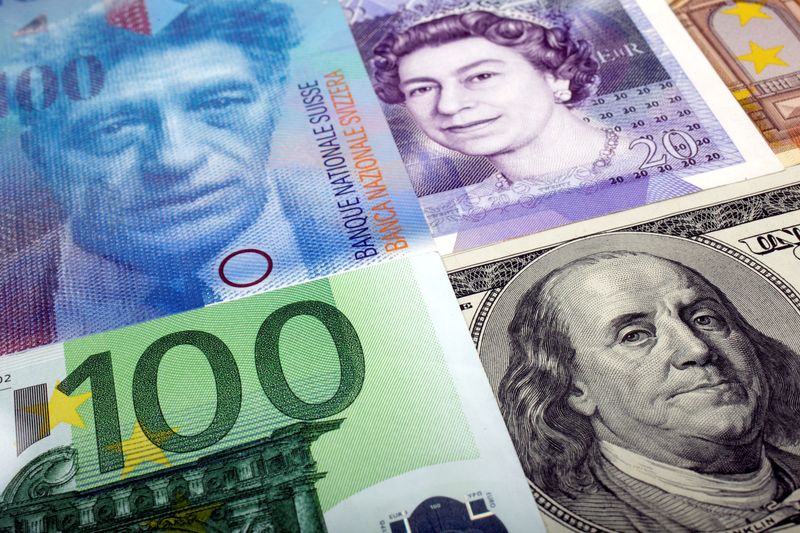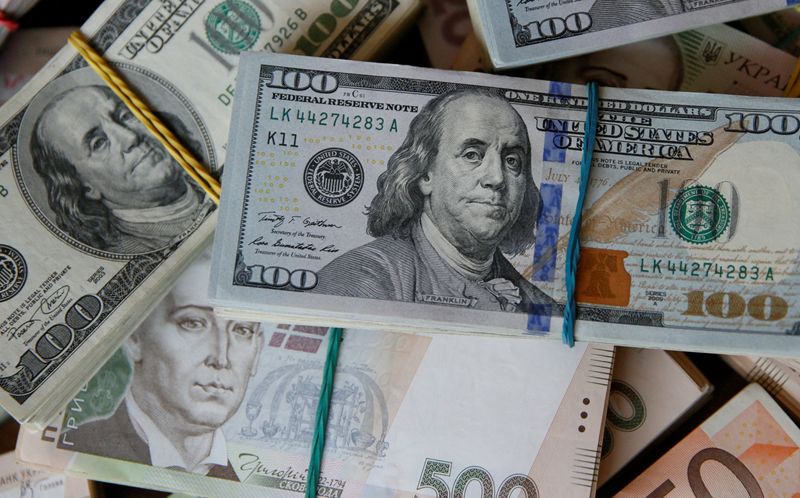(Refiles to adds dropped word in first paragraph)
By Chuck Mikolajczak
NEW YORK (Reuters) -The dollar rose against a basket of major currencies on Tuesday, reversing course after three straight sessions of declines as recession fears grew and investors awaited a Federal Reserve policy statement, while energy supply concerns weighed on the euro.
European Union countries approved a weakened emergency plan to lessen gas demand on Tuesday, after striking compromise deals to limit the cuts for some countries, as they gird for further Russian reductions in supply.
Risk-off sentiment helped boost the dollar, as U.S. equities were pulled lower following a profit warning from retail giant WalMart, which said it would slash prices to reduce inventory.
The Fed is widely expected to raise interest rates by 75 basis points on Wednesday, with investors keeping a close eye on the central bank's forward guidance as it grapples with high inflation and the potential for a recession. Last week, the European Central Bank (ECB) raised rates by 50 basis points.
"The writing is on the wall for the euro. I know it has been a punching bag for quite some time, but these growth concerns are not going to get any better, the energy crisis it just seems like it is only going to get worse," said Edward Moya, senior market analyst at Oanda in New York.
"There are growing risks we could see investors become a little bit more nervous that it might not just be a very brief recession, that it could be a little bit more hard-hitting so you are probably still going to see that safe-haven flows into the dollar are likely to remain the focal point for many traders."
The dollar index rose 0.714% at 107.180, with the euro down 0.98% to $1.012. The euro was on pace for its biggest daily percentage drop since July 11.
Data showed U.S. consumer confidence fell for a third straight month in July, while new home sales dropped to their lowest level in more than two years, signaling an economy that may be susceptible to a recession.
On Thursday, investors will get the advance reading for second-quarter gross domestic product, while Friday will bring the release of personal consumption expenditures, the Fed's preferred inflation measure.
A second straight quarter of negative growth would result in what is known as a technical recession by analysts, although an official declaration of a recession from the National Bureau of Economic Research, which uses a more comprehensive definition, would likely come much later.
On Monday, Russian energy giant Gazprom (MCX:GAZP), citing instructions from an industry watchdog, said gas flows to Germany through the Nord Stream 1 pipeline would fall to 33 million cubic meters per day from Wednesday, or half of the current flow, which was already at only 40% capacity.
The euro also fell 0.87% against the safe-havens yen to 138.450 and was down 1.1% against the Swiss franc at 0.975.

The Japanese yen weakened 0.07% versus the greenback to 136.78 per dollar, while sterling was last trading at $1.2024, down 0.15% on the day.
In cryptocurrencies, bitcoin last fell 5.75% to $20,894.37 after Bloomberg News reported the U.S. Securities and Exchange Commission (SEC) is investigating whether Coinbase (NASDAQ:COIN) Global improperly let Americans trade digital assets that should have been registered as securities.
